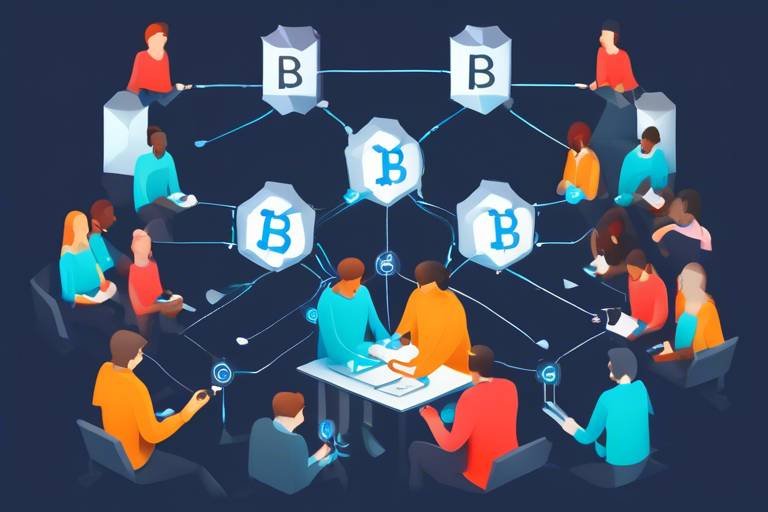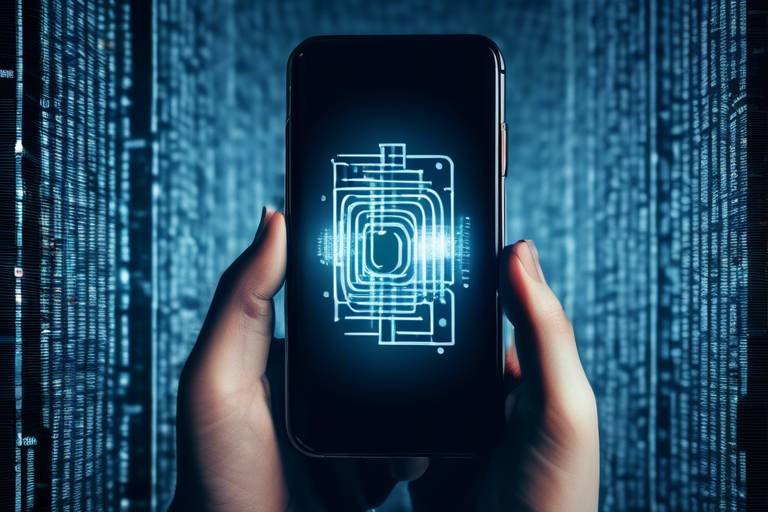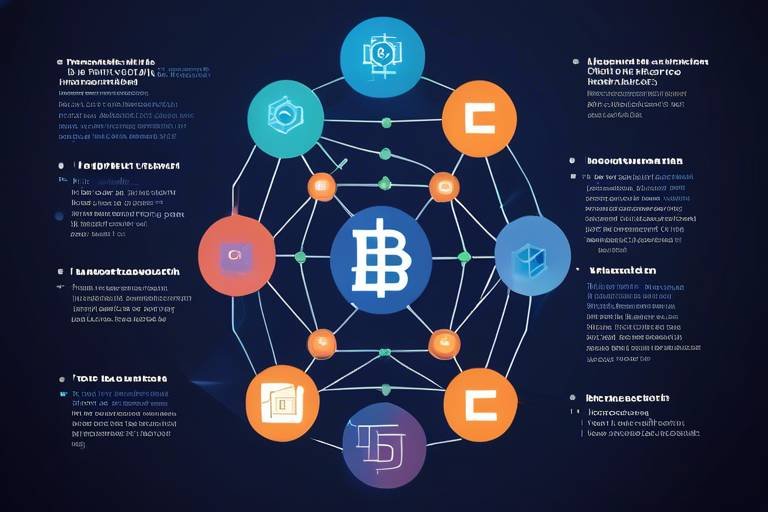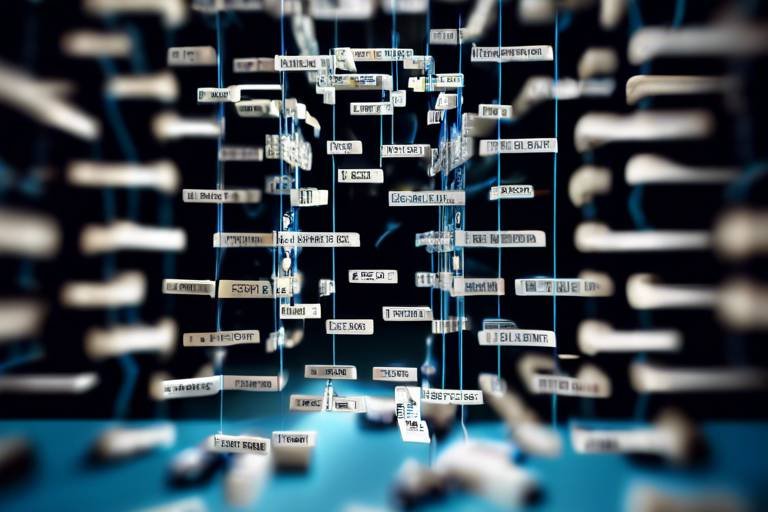The Role of Blockchain in Securing Personal Data
In today's digital age, where personal data is as valuable as gold, the need for robust security measures has never been more crucial. With data breaches making headlines almost daily, individuals and organizations alike are searching for innovative solutions to protect sensitive information. Enter blockchain technology, a revolutionary approach that promises to change the game in data security. But what exactly is blockchain, and how does it enhance the security of personal data?
Blockchain is a decentralized digital ledger that records transactions across multiple computers in a way that ensures the integrity and security of the data. Imagine it as a digital vault where every piece of information is locked away in a secure manner, making it nearly impossible for unauthorized users to gain access or tamper with it. This decentralized nature is what sets blockchain apart from traditional data storage systems, which often rely on a central authority that can be vulnerable to attacks.
As we dive deeper into the world of blockchain, you'll discover that its implications for personal data security are profound. The technology not only enhances privacy but also builds trust among users. With its transparent and immutable characteristics, blockchain can revolutionize how we think about data protection. In the sections that follow, we will explore the fundamental principles of blockchain technology, its myriad benefits for data security, real-world applications, and the challenges it faces as it strives to become the gold standard in protecting personal information.
At its core, blockchain operates on the principle of decentralization. This means that instead of relying on a single entity to manage and store data, information is distributed across a network of computers, or nodes. Each transaction is recorded in a block, and once a block is filled, it is added to a chain of previous blocks—hence the name "blockchain."
One of the most compelling features of blockchain technology is its security. Each block is linked to the previous one through cryptographic hashes, creating a secure chain of data that is nearly impossible to alter. This is akin to a chain of locks; if you tamper with one link, the entire chain becomes compromised. This level of security is particularly beneficial for storing personal data, as it significantly reduces the risk of data breaches and unauthorized access.
So, why should we care about blockchain when it comes to securing our personal data? The answer lies in its numerous advantages:
- Transparency: All transactions are visible to participants, ensuring accountability.
- Immutability: Once data is recorded, it cannot be altered or deleted, safeguarding against tampering.
- Enhanced Privacy: Users have greater control over their personal information, deciding who can access it.
These benefits collectively contribute to building trust among users. In a world where data privacy concerns are rampant, blockchain offers a glimmer of hope, providing a secure environment for personal information.
Decentralization is a core feature of blockchain technology that plays a vital role in reducing the risk of data breaches. In traditional data storage systems, having a single point of failure can lead to catastrophic outcomes. However, with blockchain, the data is distributed across a network, making it much harder for malicious actors to compromise the entire system. Think of it like a spider web; if one strand is cut, the web remains intact, ensuring that the overall structure is still secure.
Blockchain can provide users with greater control over their personal information. Through the use of cryptographic techniques, users can encrypt their data, allowing only authorized parties to access it. This not only enhances user privacy but also significantly reduces the risk of unauthorized access. It's like having a key to your diary; only those you trust can read your most personal thoughts.
The immutability of blockchain records ensures that once data is entered, it cannot be altered or deleted. This feature is crucial for protecting personal data from tampering. Imagine if your bank records could be changed at will; it would create chaos! With blockchain, however, you can rest easy knowing that your data is secure and unchanged, preserving its integrity over time.
Various industries are already implementing blockchain technology for data security. Here are a few examples:
- Healthcare: Patient records can be securely stored and shared, ensuring confidentiality and compliance with regulations.
- Finance: Transactions can be processed with enhanced security, reducing the risk of fraud.
- Supply Chain Management: Blockchain can track products from origin to consumer, ensuring authenticity and reducing the risk of counterfeit goods.
These applications showcase blockchain's versatility and effectiveness in protecting sensitive information across different sectors.
Despite its advantages, blockchain technology faces several challenges that may hinder its widespread adoption for personal data security. Issues such as scalability, regulatory complexities, and energy consumption must be addressed to unlock its full potential.
Scalability remains a significant concern for blockchain networks. As more users join the network and transaction volumes increase, the system can become congested, leading to slower processing times. This is akin to a busy highway during rush hour—traffic jams can significantly delay your journey. Exploring solutions to enhance performance is crucial for the future of blockchain technology.
Blockchain's decentralized nature raises legal and regulatory questions. Compliance with data protection laws can be complex, as the technology often transcends national borders. Establishing clear regulatory frameworks is essential to ensure safe usage and protect users' rights. Without these guidelines, blockchain's potential for securing personal data may remain untapped.
Q: What is blockchain technology?
A: Blockchain is a decentralized digital ledger that records transactions across multiple computers, ensuring data integrity and security.
Q: How does blockchain enhance data security?
A: By offering transparency, immutability, and enhanced privacy, blockchain builds trust among users and protects personal information from unauthorized access.
Q: What industries are using blockchain for data security?
A: Industries such as healthcare, finance, and supply chain management are implementing blockchain to secure sensitive information.
Q: What challenges does blockchain face?
A: Scalability, regulatory compliance, and energy consumption are significant challenges that need to be addressed for broader adoption.

Understanding Blockchain Technology
Blockchain technology is a revolutionary concept that has taken the digital world by storm. Imagine a decentralized digital ledger that securely records transactions across multiple computers. This means that instead of a single entity controlling the data, it is distributed across a network, making it incredibly difficult for hackers to manipulate or corrupt. At its core, blockchain operates on a series of fundamental principles that ensure its integrity and security.
The most crucial aspect of blockchain is its decentralization. In traditional databases, data is often stored in a central location, which creates a single point of failure. If that central server is compromised, the entire database is at risk. However, with blockchain, each participant in the network holds a copy of the entire ledger, which significantly reduces the risk of data breaches. This decentralized nature not only enhances security but also promotes transparency among users.
When a transaction occurs, it is bundled with others into a block. This block is then verified by multiple nodes (computers) in the network through a process known as consensus. Once verified, the block is added to a chain of previous blocks, hence the name blockchain. This process is not only secure but also ensures that all participants have access to the same information, which fosters trust.
To further understand how blockchain works, let’s break it down into key components:
- Nodes: These are individual computers that participate in the blockchain network, validating and storing data.
- Blocks: Each block contains a set of transactions and is linked to the previous block, forming a chain.
- Consensus Mechanisms: These are protocols that ensure all nodes agree on the validity of transactions before they are added to the blockchain.
- Cryptography: Blockchain uses cryptographic techniques to secure data, ensuring that only authorized users can access or alter it.
One of the standout features of blockchain is its security. Each transaction is encrypted, and once it is recorded, it cannot be altered or deleted. This immutability means that the data remains intact and can be trusted, which is particularly important when it comes to personal information. Think of it as a digital vault where your data is locked away, and only you hold the key.
As we delve deeper into the world of blockchain, it becomes clear that its potential applications are vast. From enhancing data privacy in healthcare to securing financial transactions, blockchain technology is poised to change how we think about data security. Its innovative approach to decentralization and encryption not only protects personal data but also empowers users by giving them greater control over their information.
In summary, understanding blockchain technology is essential for anyone interested in the future of data security. Its decentralized nature, combined with robust cryptographic measures, makes it a formidable tool in the fight against data breaches and unauthorized access. As we continue to explore its applications and benefits, it’s evident that blockchain is not just a passing trend; it’s a fundamental shift in how we manage and protect personal data.

Benefits of Blockchain for Data Security
In today’s digital age, where data breaches and privacy concerns seem to be lurking around every corner, the quest for a reliable solution to secure personal information has never been more critical. Enter blockchain technology, a game-changer that is not just a buzzword but a revolutionary method for safeguarding data. One of the most compelling benefits of blockchain is its inherent transparency. Unlike traditional systems where you have to trust a single authority, blockchain operates on a decentralized network. This means that every transaction is visible to all participants, creating an environment of trust. Imagine a public library where every book is recorded in a ledger that everyone can see; this is how blockchain works, ensuring that no one can manipulate the information without others noticing.
Another significant advantage is immutability. Once data is recorded on the blockchain, it cannot be altered or deleted. This feature acts like a digital fortress, protecting personal data from tampering. For instance, think of it as writing in stone rather than on paper. If someone tries to change a record, the original remains intact, and the attempt becomes evident. This is particularly vital in sectors like finance and healthcare, where the integrity of data is paramount.
Furthermore, blockchain enhances user privacy through advanced cryptographic techniques. Users have greater control over their information, deciding who gets access and what data can be shared. This is akin to having a personal vault where you control the keys; only those you trust can enter. Such privacy measures not only protect personal data but also empower users, making them active participants in their data security journey.
To sum up, the benefits of blockchain for data security can be encapsulated in the following key points:
- Transparency: Everyone can see the same data, fostering trust.
- Immutability: Once recorded, data cannot be changed or deleted.
- Enhanced Privacy: Users have control over their personal information.
As we delve deeper into the digital realm, leveraging these benefits can significantly bolster data security. Companies and individuals alike can harness the power of blockchain to create a safer online environment, ultimately leading to a more secure future.

Decentralization and Its Importance
Decentralization is one of the most revolutionary aspects of blockchain technology. Imagine a world where your data isn’t stored in a single, vulnerable location but is instead distributed across a vast network of computers. This is the essence of decentralization. By eliminating single points of failure, blockchain reduces the risk of data breaches that are all too common in traditional data storage systems. In other words, if one node in the network is compromised, the integrity of the entire system remains intact. This is akin to having multiple locks on your door; even if one lock is picked, the others still provide security.
The importance of decentralization extends beyond just security; it fosters trust among users. When users know that their personal data is not controlled by a single entity, they are more likely to engage with digital services. This trust is essential in today's digital age, where data privacy concerns are at an all-time high. With decentralization, users can have greater confidence that their information is safe from unauthorized access and manipulation.
Moreover, decentralization promotes transparency. In a decentralized blockchain network, every participant has access to the same information. This transparency is crucial for building accountability and trust. For instance, if a healthcare provider uses blockchain to store patient records, patients can verify that their data is handled correctly and securely without relying solely on the provider's word. This level of visibility is a game-changer in industries where trust is paramount.
However, it’s important to recognize that decentralization is not without its challenges. While it enhances security and trust, the complexity of managing a decentralized network can be daunting. The need for consensus among various nodes can lead to delays in processing transactions, which can be a hurdle for industries requiring rapid data access. Nevertheless, the advantages of decentralization in enhancing data security and privacy far outweigh these challenges, making it a critical component of blockchain technology.
In summary, decentralization is not just a technical feature of blockchain; it is a fundamental principle that redefines how we think about data security. By distributing data across a network, blockchain technology mitigates risks, builds trust, and fosters transparency, making it a powerful tool for securing personal information in our increasingly digital world.
- What is decentralization in blockchain?
Decentralization in blockchain refers to the distribution of data across multiple nodes, eliminating single points of failure and enhancing security.
- How does decentralization enhance security?
By spreading data across a network, decentralization reduces the risk of data breaches, as compromising one node does not jeopardize the entire system.
- Why is trust important in data security?
Trust is crucial as it encourages user engagement and confidence in digital services, especially in sectors handling sensitive information.
- What challenges does decentralization face?
Challenges include managing network complexity and achieving consensus among nodes, which can slow down transaction processing.

Enhanced Privacy Measures
In today’s digital landscape, where personal information is often treated as a commodity, the need for enhanced privacy measures has never been more pressing. Blockchain technology steps into this arena like a knight in shining armor, offering users a level of control over their personal data that traditional systems simply cannot match. By leveraging cryptographic techniques, blockchain ensures that users can manage their information securely and privately, free from the prying eyes of unauthorized entities. Imagine a world where you hold the keys to your data vault—this is what blockchain promises.
One of the standout features of blockchain is its ability to provide users with greater control over their personal information. Unlike conventional databases that store data in a centralized location, making it vulnerable to breaches, blockchain decentralizes data storage across a network of computers. This means that instead of a single target for hackers, data is spread out, making unauthorized access significantly more challenging. To put it simply, if traditional data storage is like a single bank vault, blockchain resembles a network of secure safes scattered across the globe.
Moreover, the use of cryptographic techniques in blockchain not only secures data but also enhances user privacy. When users share their information on a blockchain, it is encrypted, ensuring that only those with the correct decryption keys can access it. This is akin to sending a locked box through the mail—only the intended recipient has the key to open it. This encryption process not only protects personal data from unauthorized access but also allows users to share specific pieces of information without revealing their entire identity. For example, in a healthcare setting, a patient could share their medical history with a doctor without exposing their entire identity, ensuring privacy while still receiving the necessary care.
Furthermore, blockchain’s inherent transparency allows users to track how their data is being used. This feature is crucial in building trust between users and organizations. Imagine being able to see exactly who accessed your information and when. This level of visibility means that users can make informed decisions about their data, choosing to share it only with trusted entities. Transparency not only empowers users but also holds organizations accountable for their data usage, creating a safer digital environment.
To summarize, blockchain technology introduces a revolutionary approach to privacy in the digital realm. By decentralizing data storage, employing cryptographic techniques, and providing transparency, it enables users to maintain control over their personal information. As we continue to navigate the complexities of the digital age, the enhanced privacy measures offered by blockchain could be the key to safeguarding our most sensitive data.
- What is blockchain technology?
Blockchain is a decentralized digital ledger that records transactions across multiple computers in a way that the registered information cannot be altered retroactively.
- How does blockchain enhance privacy?
Blockchain enhances privacy through encryption and decentralization, allowing users to control their data and share only what they choose with specific parties.
- Can blockchain prevent data breaches?
While blockchain significantly reduces the risk of data breaches by eliminating central points of failure, it is not entirely immune to attacks, particularly if users do not practice good security hygiene.
- What industries are using blockchain for data security?
Industries such as healthcare, finance, and supply chain management are increasingly adopting blockchain technology to secure sensitive information.

Immutable Data Records
One of the standout features of blockchain technology is its immutability, a term that essentially means once data is recorded on a blockchain, it cannot be altered or deleted. Imagine writing something in ink on a piece of paper; once it’s there, it’s there for good. This characteristic is crucial for enhancing the security of personal data. In a world where data breaches and identity theft are alarmingly common, the ability to ensure that personal information remains intact is nothing short of revolutionary.
So, how does this work? Each block in a blockchain contains a unique cryptographic hash of the previous block, along with a timestamp and transaction data. This creates a chain of blocks that are linked together, forming an unbreakable record. If someone attempts to change the data in one block, the hash will change, which will then invalidate all subsequent blocks. This makes tampering not only incredibly difficult but also easily detectable. In essence, blockchain acts as a digital fortress, safeguarding personal data against unauthorized alterations.
To illustrate this further, let’s consider an example from the healthcare sector. Patient records are highly sensitive and must be protected at all costs. By utilizing blockchain, healthcare providers can ensure that once patient information is entered, it remains unchanged. This not only builds trust with patients but also complies with regulations regarding data integrity. The confidence that comes from knowing that their information is secure can encourage individuals to seek medical advice without fear of their data being manipulated.
However, while the benefits are clear, it’s essential to acknowledge that immutability does come with its own set of challenges. For instance, if incorrect information is entered into the blockchain, such as a misdiagnosis, the inability to change this data could lead to significant issues. This raises the question: how do we balance the need for immutability with the necessity of correcting errors? One proposed solution is to implement a system of permissions where only authorized personnel can add or update data, while still maintaining the overall integrity of the blockchain.
In summary, the immutability of blockchain records is a critical component of its ability to secure personal data. It creates a transparent, trustworthy environment where individuals can feel safe sharing their information. As we continue to explore the potential of blockchain technology, understanding and addressing its challenges will be essential in harnessing its full capabilities for data security.
Frequently Asked Questions
- What happens if incorrect data is entered into the blockchain?
While the data cannot be altered, solutions such as permissioned access can help manage corrections without compromising the integrity of the entire system. - Is blockchain completely secure?
While blockchain offers significant security advantages, it is not infallible. Other security measures should be implemented alongside blockchain to ensure comprehensive protection. - Can blockchain be used for all types of data?
Yes, blockchain can be applied across various sectors, including healthcare, finance, and supply chain management, to secure sensitive information.
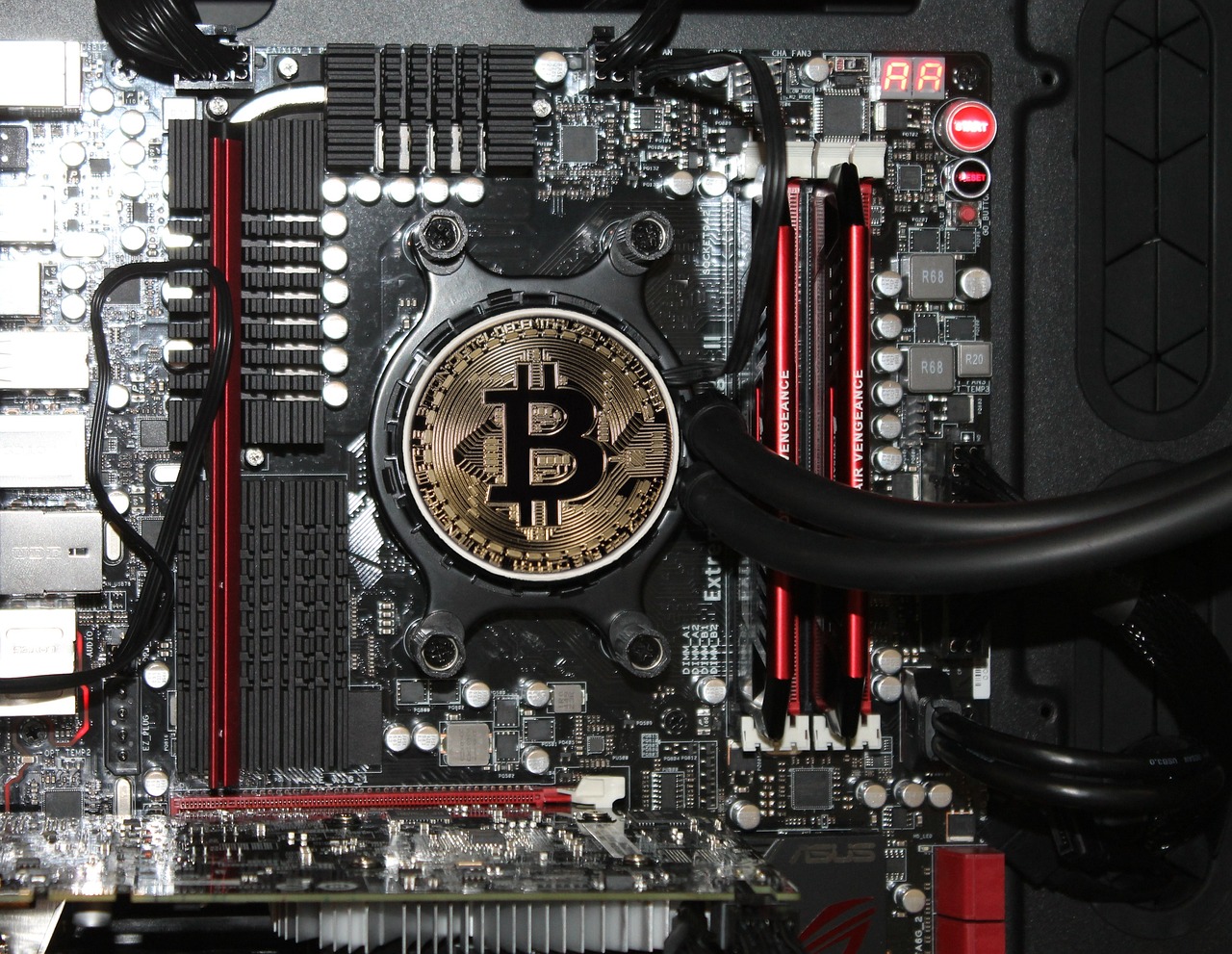
Real-World Applications of Blockchain
Blockchain technology is not just a buzzword; it’s a transformative force that is making waves across various industries. One of the most compelling aspects of blockchain is its ability to enhance data security and integrity. Let’s dive into some of the most significant real-world applications of blockchain that illustrate its potential to protect sensitive information and revolutionize data handling.
In the healthcare sector, for instance, blockchain is being employed to secure patient records. Traditional systems often struggle with data breaches, leading to unauthorized access to sensitive health information. By utilizing blockchain, healthcare providers can create a secure, immutable record of patient data that is only accessible to authorized personnel. This not only enhances patient privacy but also facilitates seamless sharing of medical records between institutions, improving the overall quality of care.
Another industry where blockchain is making a substantial impact is finance. Financial institutions are leveraging blockchain to secure transactions and reduce fraud. With its decentralized nature, blockchain eliminates the need for intermediaries, thus speeding up transactions while also lowering costs. For example, cross-border payments that typically take days can now be completed in a matter of minutes. Additionally, the transparency of blockchain allows for real-time tracking of transactions, which builds trust among users.
Furthermore, the supply chain management sector is harnessing blockchain to enhance transparency and traceability. Companies can track the journey of products from the manufacturer to the end consumer, ensuring that every step of the process is recorded and verifiable. This is particularly crucial for industries like food and pharmaceuticals, where safety and authenticity are paramount. By using blockchain, businesses can quickly identify and address issues such as recalls, thereby protecting consumers and maintaining brand integrity.
Moreover, the real estate industry is exploring blockchain for property transactions. Traditional real estate transactions often involve a cumbersome process with multiple parties and extensive paperwork. Blockchain can simplify this process by providing a secure platform for recording property deeds and transactions, reducing the risk of fraud and streamlining the entire buying and selling experience. Imagine being able to buy a house with just a few clicks, all while ensuring that the transaction is secure and transparent!
Here’s a quick overview of some sectors currently utilizing blockchain technology:
| Industry | Application | Benefits |
|---|---|---|
| Healthcare | Securing patient records | Enhanced privacy and data sharing |
| Finance | Streamlining transactions | Reduced fraud and lower costs |
| Supply Chain | Tracking product journeys | Increased transparency and safety |
| Real Estate | Recording property transactions | Simplified processes and fraud reduction |
In conclusion, the real-world applications of blockchain are vast and varied, showcasing its ability to enhance data security and privacy across multiple sectors. As more industries recognize the advantages of implementing blockchain technology, we can expect to see a significant shift in how personal data is managed and protected, paving the way for a more secure digital landscape.
- What is blockchain technology? Blockchain is a decentralized digital ledger that records transactions securely across multiple computers.
- How does blockchain enhance data security? By providing an immutable record and eliminating single points of failure, blockchain significantly reduces the risk of data breaches.
- Which industries are using blockchain? Industries such as healthcare, finance, supply chain management, and real estate are leveraging blockchain for enhanced data security and efficiency.
- What are the challenges of using blockchain? Scalability, regulatory compliance, and energy consumption are some of the challenges that blockchain technology faces.

Challenges and Limitations
While blockchain technology offers a plethora of advantages for securing personal data, it is not without its challenges and limitations. Understanding these hurdles is essential for anyone considering the adoption of blockchain for data security. One of the most significant concerns is scalability. As more users and transactions are added to the network, the ability of blockchain to process these transactions efficiently can become strained. This is particularly evident in public blockchain systems like Bitcoin and Ethereum, where transaction speeds can slow down, leading to increased fees and longer waiting times. Imagine a busy highway during rush hour; just as traffic jams can hinder movement, a congested blockchain can stall data transactions, causing frustration for users.
Another challenge lies in regulatory and compliance issues. Blockchain's decentralized nature raises a host of legal questions. For instance, how do we ensure compliance with data protection laws like GDPR when the data is distributed across multiple nodes? This complexity can deter businesses from fully embracing blockchain technology. It’s akin to trying to navigate a maze without a map; the lack of clear guidelines can lead to uncertainty and hesitation among organizations looking to implement blockchain solutions.
Moreover, energy consumption is a pressing concern. Many blockchain networks, especially those that utilize a proof-of-work consensus mechanism, require vast amounts of energy to operate. This not only raises environmental concerns but also leads to higher operational costs. To illustrate, a report from the Cambridge Centre for Alternative Finance indicates that Bitcoin mining alone consumes more energy annually than some small countries. As the world becomes increasingly aware of climate change, the sustainability of blockchain technology will likely come under scrutiny.
In addition to these challenges, there are also concerns regarding user education and awareness. Many individuals and businesses still lack a fundamental understanding of how blockchain works and its potential benefits. This lack of knowledge can be a barrier to adoption, much like trying to sell a new gadget to someone who doesn’t understand its features. To foster a greater understanding, educational initiatives and resources are crucial.
To summarize, while blockchain technology holds immense potential for enhancing data security, it also faces significant challenges that must be addressed. These include:
- Scalability: The ability to efficiently process a growing number of transactions.
- Regulatory Compliance: Navigating the legal landscape surrounding decentralized data.
- Energy Consumption: The environmental impact and operational costs of maintaining blockchain networks.
- User Education: The need for increased awareness and understanding of blockchain technology.
Addressing these challenges will be crucial for the widespread adoption of blockchain in securing personal data. As the technology continues to evolve, it is likely that solutions will emerge to mitigate these limitations, paving the way for a more secure digital future.
Q1: What is blockchain technology?
A1: Blockchain is a decentralized digital ledger that records transactions across multiple computers, ensuring that the recorded data is secure and immutable.
Q2: How does blockchain enhance data security?
A2: Blockchain enhances data security through its decentralized nature, which reduces the risk of data breaches, and its immutability, which prevents tampering with stored data.
Q3: What are the main challenges of using blockchain for personal data security?
A3: The main challenges include scalability issues, regulatory compliance complexities, high energy consumption, and the need for improved user education.
Q4: Can blockchain technology be used in various industries?
A4: Yes, blockchain technology can be applied across multiple sectors, including healthcare, finance, and supply chain management, to enhance data security and privacy.
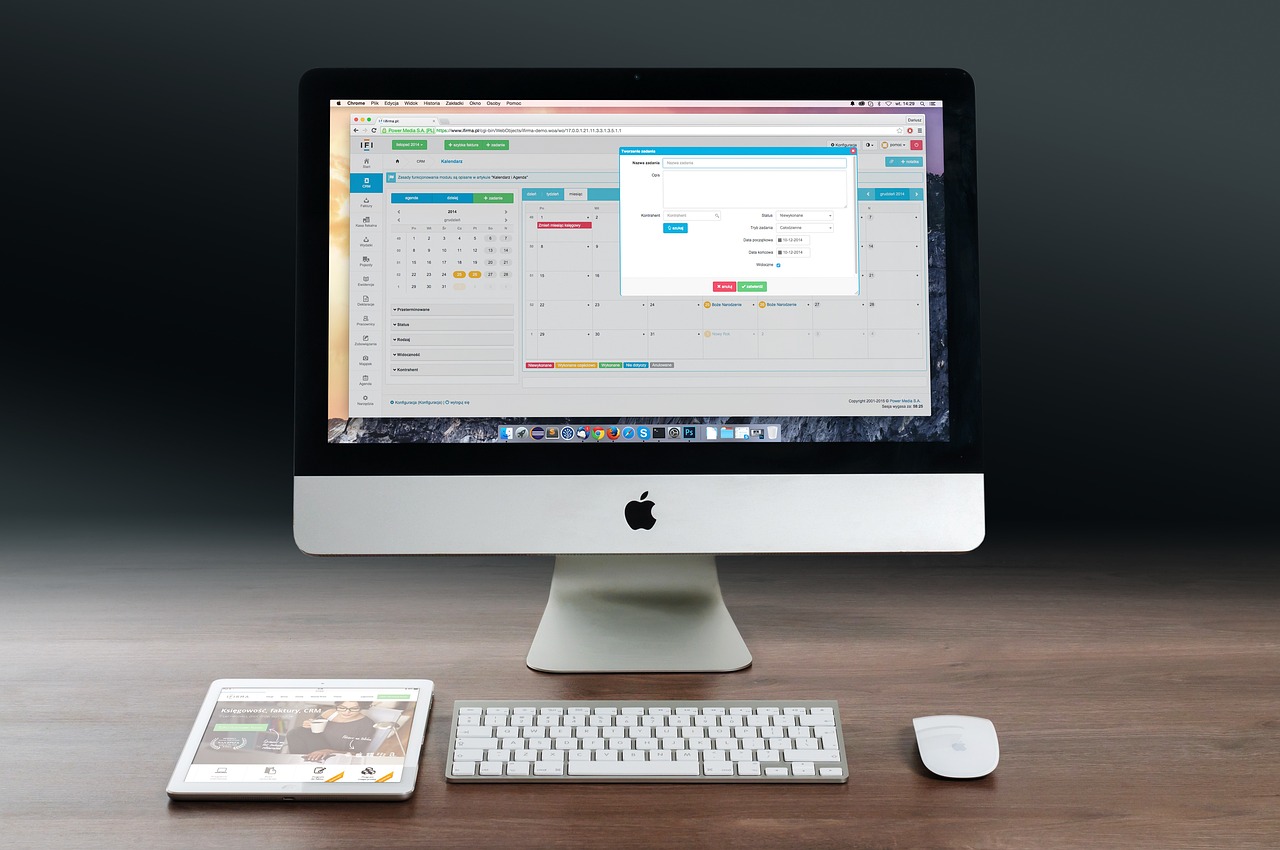
Scalability Issues
Scalability remains one of the most significant challenges facing blockchain technology today. While the concept of a decentralized ledger is revolutionary, the reality is that as more users and transactions are added to a blockchain network, the system can become overwhelmed. Imagine trying to fit a growing crowd into a small room—eventually, it becomes too crowded, and some people might not even get in. This analogy perfectly illustrates how blockchain networks can struggle with scalability.
One of the primary reasons for these scalability issues is the way transactions are processed. Most blockchain networks, including Bitcoin and Ethereum, rely on a consensus mechanism known as Proof of Work (PoW). In this system, miners compete to solve complex mathematical problems to validate transactions. While this process ensures security and decentralization, it also leads to delays and higher transaction costs as the network becomes congested.
To better understand the impact of scalability on blockchain, let’s look at some key factors:
- Transaction Speed: The average time it takes to confirm a transaction can increase significantly during peak usage times, leading to frustration among users.
- Network Fees: As demand rises, so do the fees associated with transactions, making it less affordable for everyday users.
- Energy Consumption: The energy required for mining and processing transactions can skyrocket, raising concerns about environmental sustainability.
To address these issues, several solutions have been proposed and are currently under development. Some of the most promising include:
| Solution | Description |
|---|---|
| Layer 2 Solutions | These solutions operate on top of the main blockchain, allowing for faster transactions and reduced congestion. |
| Sharding | This technique involves breaking the blockchain into smaller, more manageable pieces (shards) that can process transactions simultaneously. |
| Alternative Consensus Mechanisms | Transitioning from PoW to more scalable mechanisms like Proof of Stake (PoS) can enhance transaction speeds and reduce energy consumption. |
While these solutions show promise, implementing them is not without its challenges. Each approach requires careful consideration of security, user experience, and the overall integrity of the blockchain. As the technology evolves, addressing scalability issues will be crucial for the widespread adoption of blockchain as a secure method for managing personal data.
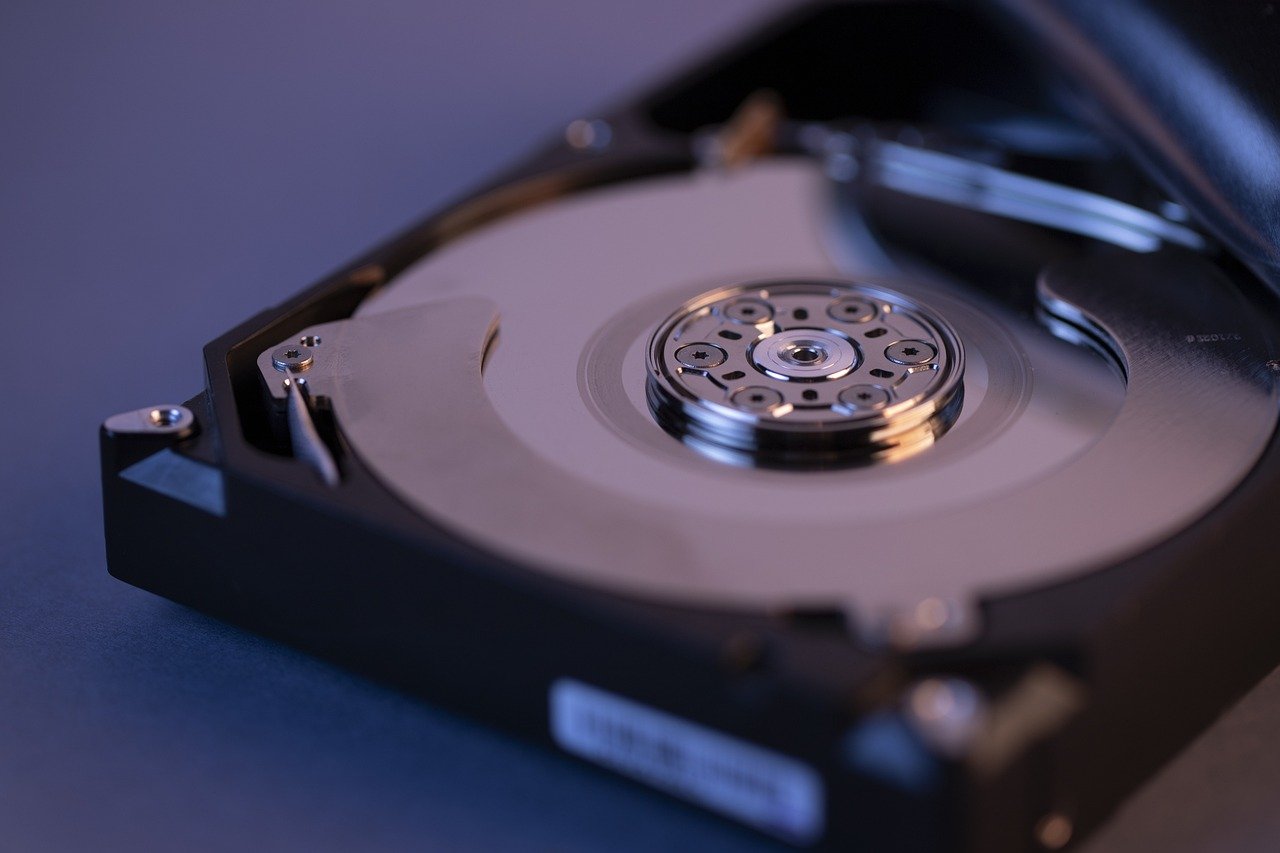
Regulatory and Compliance Challenges
As much as blockchain technology offers revolutionary potential for securing personal data, it also brings with it a host of that cannot be overlooked. The decentralized nature of blockchain, while a significant advantage, complicates the legal landscape. Traditional data protection laws were designed with centralized systems in mind, which means they often struggle to accommodate the unique characteristics of blockchain. For instance, how do you apply the General Data Protection Regulation (GDPR) to a system where data is immutable and distributed across multiple nodes? This question is at the forefront of discussions among regulators and technologists alike.
One of the primary challenges is the issue of data ownership. In a blockchain environment, users typically retain control over their data, which raises questions about consent and the right to be forgotten. Under GDPR, individuals have the right to request the deletion of their personal data, but if that data is stored on a blockchain, how can it be removed without compromising the integrity of the entire ledger? This paradox presents a significant hurdle for businesses looking to adopt blockchain solutions while remaining compliant with existing regulations.
Furthermore, the lack of a centralized authority in blockchain networks makes it difficult to enforce compliance. Regulatory bodies are often ill-equipped to monitor and govern decentralized systems effectively. This gap creates uncertainty for organizations that want to innovate using blockchain but fear potential legal repercussions. To navigate this complex landscape, companies may need to establish their own compliance frameworks, which can be both time-consuming and costly.
In addition to these challenges, there are also concerns regarding cross-border data transfers. Blockchain technology enables global transactions, but different countries have varying regulations regarding data protection. For instance, while the European Union has stringent data privacy laws, other regions may have more relaxed standards. This discrepancy can lead to complications for businesses operating internationally, as they must ensure compliance with multiple regulatory frameworks simultaneously.
To address these challenges, the development of clear regulatory guidelines specifically tailored for blockchain technology is essential. Policymakers need to engage with blockchain experts to create a framework that balances innovation with the necessary protections for personal data. Until then, organizations must tread carefully, ensuring they understand the legal implications of their blockchain initiatives.
- What are the main regulatory challenges blockchain faces?
The main challenges include data ownership issues, compliance with existing data protection laws like GDPR, and the lack of a centralized authority to enforce regulations. - How does blockchain affect data privacy?
Blockchain enhances data privacy by allowing users to control their own data, but it complicates compliance with regulations that require data deletion and modification. - Can blockchain be compliant with GDPR?
Yes, but it requires careful consideration of how data is managed on the blockchain, particularly regarding data deletion rights.
Frequently Asked Questions
- What is blockchain technology?
Blockchain technology is a decentralized digital ledger that records transactions across multiple computers. It ensures that the recorded data is secure, transparent, and immutable, making it an ideal solution for storing personal data.
- How does blockchain enhance personal data security?
Blockchain enhances personal data security through its core features like decentralization, immutability, and enhanced privacy. By eliminating single points of failure and ensuring that data cannot be altered or deleted, it significantly reduces the risk of data breaches.
- What are the key benefits of using blockchain for data security?
The main benefits include increased transparency, improved privacy for users, and the assurance that data records are immutable. These advantages help build trust among users and organizations alike.
- How does decentralization contribute to data security?
Decentralization reduces the risk of data breaches by distributing data across a network of computers instead of relying on a single central server. This means that even if one part of the network is compromised, the entire system remains secure.
- What challenges does blockchain face regarding scalability?
Scalability is a significant challenge for blockchain networks, as processing large volumes of transactions can lead to slow performance. Solutions like sharding and layer-2 protocols are being explored to enhance scalability.
- Are there regulatory issues surrounding blockchain technology?
Yes, blockchain's decentralized nature raises legal and regulatory questions, particularly concerning compliance with data protection laws. There is a need for clear regulatory frameworks to ensure safe and effective usage of blockchain technology.
- Can blockchain provide users with control over their personal data?
Absolutely! Blockchain allows users to have greater control over their personal information through cryptographic techniques that enhance privacy and reduce the risk of unauthorized access.
- What industries are currently using blockchain for data security?
Various industries are implementing blockchain for data security, including healthcare, finance, and supply chain management. Each sector benefits from blockchain's ability to protect sensitive information effectively.
- How does blockchain ensure data immutability?
Blockchain ensures data immutability by design. Once data is entered into the blockchain, it cannot be altered or deleted without the consensus of the network, protecting personal data from tampering.






